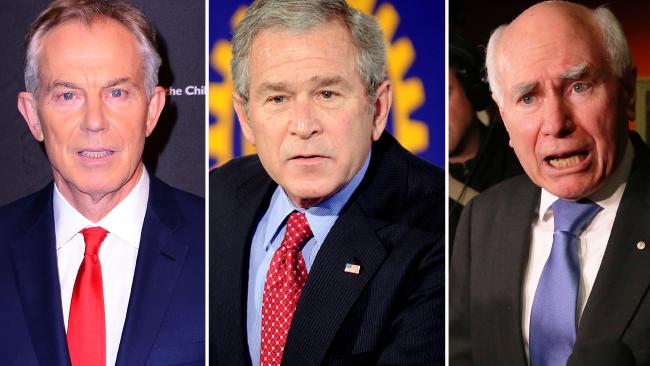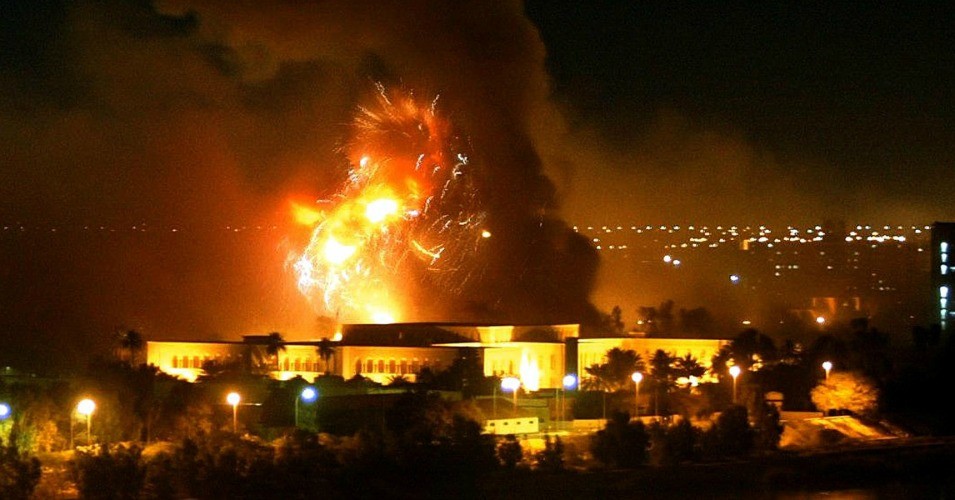
Former British Prime Minister Tony Blair ordered the 1998 bombing of Iraq despite repeated warnings that such a move was unlawful, according to documents published by Declassified UK, an investigative outlet that focuses on UK’s military and intelligence agencies, on 17 April 2023 (https://declassifieduk.org/blair-misled-parliament-over-1998-iraq-bombing-files-show/). Blair would follow the same template – insisting that illegal military action was legal – when the UK invaded Iraq in 2003.
The U.S. and UK launched a four-day bombing campaign against Iraq in December 1998, after then-U.S. President Bill Clinton accused Saddam Hussein of breaching commitments to the UN and developing weapons of mass destruction. As many as 1,400 Iraqi soldiers were killed in strikes on around 100 military facilities.
In the runup to the bombings, Blair was repeatedly told by his advisers that using force against Iraq would be illegal without a resolution from the UN Security Council, according to documents from the National Archives cited by Declassified UK.
Attorney General John Morris reportedly told Blair in November 1997 that obtaining a statement from the Security Council would be “an essential precondition” to military action, while Blair’s private secretary, John Holmes, told the prime minister that British law officers and Foreign Secretary Robin Cook had a “serious problem about using forces unless the Security Council declares that Iraq is in ‘material breach’ of previous resolutions.”
When the law officers refused to authorize the military to draw up targeting plans, Blair reportedly wrote to Holmes, stating that he found their argument “unconvincing.”
Blair continuously received warnings throughout 1998, the report alleged, with Cook’s private secretary writing to Holmes that February to warn that “the negative implications for international support if we resort to military action without a new resolution would be serious.”
When Blair announced military action to Parliament in November, he declared: “I have no doubt that we have the proper legal authority, as it is contained in successive Security Council Resolution documents.”
British officials claimed that a 1990 resolution authorizing UN members to force Hussein’s army out of Kuwait gave them permission to intervene again in Iraq, an argument that only the U.S., Japan, and Portugal supported.
According to the documents, Blair saw bombing Iraq as essential to maintaining his close relationship with Clinton. In a meeting with advisers in November, he supposedly said that failing to intervene would cause “extreme damage” to U.S.-UK relations. That same day, even as his own aides maintained that intervention was illegal, Blair told Clinton that the U.S. “could count on our support.”
Five years later, Blair would find himself in the same situation, when he falsely claimed that Hussein was harboring weapons of mass destruction and invoked earlier Security Council resolutions to justify invading Iraq. Again, Blair was warned by his attorney general that military action would defy international law, and again he pressed ahead regardless.
More than a decade later, a public inquiry found that the legal case for the invasion was “far from satisfactory,” while then-UN Secretary General Kofi Annan maintained from the outset that the war was “illegal.”
BLAIR MISLED PARLIAMENT OVER 1998 IRAQ BOMBING, FILES SHOW — by Mark Curtis, editor of Declassified UK, and author of five books and many articles on UK foreign policy, said:
- Blair’s dismissal of legal advice in 1998 likely set the stage for the illegal invasion of Iraq in 2003.
- Chair of the Joint Intelligence Committee warned that “acting against UN principles….is in the long term wholly contrary to our interests”.
- Blair was motivated more by maintaining relations with the U.S. than by international law.
The report said:
Tony Blair and his closest advisers were consistently informed by British legal advisers in 1997 and 1998 that attacking Iraq would not be lawful – but still went ahead in authorising four days of bombing in December 1998.
The declassified British documents at the National Archives show Blair was already set on taking military action against Saddam Hussein’s regime throughout 1998 in the absence of legal arguments to justify it.
The Labour prime minister’s dismissal of legal objections to his 1998 bombing campaign – known as Operation Desert Fox – was a direct precursor to his stance over the invasion of Iraq five years later in 2003, which was also deemed illegal.
The four-day bombing campaign on Iraq from 16 to 19 December 1998 by the U.S. and British militaries sought to degrade Iraq’s ability to store and produce weapons of mass destruction.
It said:
U.S. president Bill Clinton was widely criticised for ordering the December bombing as a distraction from the ongoing impeachment proceedings against him over sexual harassment charges and his relationship with White House intern Monica Lewinsky.
‘Essential precondition’
The report said:
The British files show Blair was told for over a year before the 1998 bombing that using force in Iraq would only be lawful if a new UN Security Council resolution were to be passed saying Saddam was in “material breach” of Iraq’s previous commitments.
Blair’s private secretary, John Holmes, informed his boss on 12 November 1997 that British law officers and foreign secretary Robin Cook “are convinced we have a serious problem about using force unless the Security Council declares that Iraq is in ‘material breach’ of previous resolutions. That may be unattainable.”
Holmes’ minute also indicated some of Blair’s own thinking.
He wrote to Blair: “The lawyers will also be inclined to fuss constantly about how far whatever force we use is related to Iraq’s offence and proportionate. Like you, I have doubts about how far international law can really be used in the way the lawyers want to use it… but it will be very hard to dismiss the legal arguments altogether”.
Holmes then added that “it is probably sensible to prepare to deploy British forces” but cautioned that “we will need a careful press line”.
Two days later, on 14 November, the prime minister was expressly told by John Morris, the Attorney General, that “an essential precondition” to using force would be a Security Council “statement”.
Morris’s only qualification was that “exceptional circumstances could arise” where the international community as a whole, in the absence of a statement, agreed that Iraq “had in effect repudiated the ceasefire and that a resort to force…was the only way to ensure compliance with the ceasefire conditions”.
Holmes, who went on to become an ambassador and then chair of the Electoral Commission, told Blair on the same day: “As I have said before, we can regard these legal arguments as misplaced but they cannot be ignored. The resignation of a Law Officer, if it came to that, would be pretty bad. They therefore need to be kept on board”.
But then he also added: “We must certainly try to consult them before we do anything serious, if at all possible, even if you have to override their views”.
‘Sound legal basis’
The report said:
As military planning to strike Iraq continued into 1998, ministers considered the legality of allowing U.S. aircraft to bomb the country using the British-occupied island of Diego Garcia, a military base in the Indian Ocean.
The Attorney General again wrote to Blair on 12 February reaffirming that “the lawfulness of attacking specific targets in Iraq also depends on there being a sound legal basis for the use of force”.
Michael Pakenham, the chair of the Joint Intelligence Committee, told Holmes: “The Law Officers are declining to give clearance to the targeting plans because, as set out in the Attorney General’s minute of 12 February to the prime minister, they do not feel that they are yet in a position to pronounce on the lawfulness of the overall operation”.
Pakenham then added: “it would be helpful if the prime minister could have a private word with the Law Officers”.
Blair penned a personal note to John Holmes on this bundle of papers, saying: “I still find the law officers advice unconvincing”.
He added: “There must at the very least be an argument that the S.C. [Security Council] has agreed there is a breach. The only issue is can we use force and why not if it is the only way to compliance.”
‘New resolution’
The report added:
Also on 12 February 1998, the Foreign Office’s legal adviser, Sir Franklin Berman, weighed in. He wrote to his department’s senior civil servant stating: “The only valid claim to employ force (in this case) is under the authority of the Security Council…My view is that a new resolution in suitable terms is a sina qua non”.
He added: “The Ministerial Code requires Ministers to comply with the law, including international law…I cannot believe that Ministers would wish to order British servicemen into action unless their legal advisers were able to assure them that it was legally justifiable”.
Blair was again told of the Foreign Office view two days later, on 14 February, in a meeting with his Solicitor-General Charles Falconer.
He told Blair that in the Foreign Office “some lawyers argued very strongly that it would be the first time since 1956 that the UK had used force without the backing of the Security Council Resolution” – referring to Britain’s ill-fated invasion of Egypt over Suez.
“Some lawyers might feel strongly enough to resign”, Falconer warned Blair, since they might be expected to implement decisions “that they believed were incompatible with international law”.
According to the minutes of the meeting, Blair replied saying “he could not believe that there was not an alternative case to be made, even if the issue was not clear-cut”.
‘Preferable’
Five days later, on 19 February, Blair, Cook and defence secretary George Robertson attended a briefing by Chief of the Defence Staff (CDS) Sir Charles Guthrie and Air Marshal John Day on “targeting plans for operations against Iraq”.
The minutes note that the “CDS mentioned that he was worried about the legal side; he hoped this could be sorted quickly”.
The minutes then state: “The prime minister noted that the legal advice was that securing another SCR [Security Council Resolution] was preferable.”
It added: “The key issues, though, were whether Saddam was in breach of SCRs [Security Council resolutions] and whether force was a legitimate response to that breach…The prime minister concluded that…he did not want to have everything depending on securing a further Resolution”.
In fact, Blair had been told by then that a further resolution was essential, not preferable. His last comment implied that he would be prepared to use military force without such a resolution – which is indeed what happened later in the year.
‘Exceptional circumstances’
It said:
One note in the bundle of papers – which is undated but likely to be from February 1998 – appears to be from officials ahead of a meeting between Blair and Attorney General John Morris. It suggests how Blair pressed Morris to legally justify the use of force.
Headlined “Speaking Notes for the Prime Minister: Iraq – The Legal Position”, it begins by saying: “I fully appreciate that the legal basis for use [sic] of military force against Iraq must be properly assessed before force is authorised”.
It refers to Morris’s memo of 14 November 1997 pointing out that it “helpfully indicated” there could be “exceptional circumstances” in which the use of force could be justified without a Security Council statement. It then says: “I trust that you can confirm now that my description of what would constitute ‘exceptional circumstances’ is correct”.
In the note, the justification for claiming that “exceptional circumstances” were prevailing was that Saddam Hussein was in breach of various Security Council resolutions – essentially, the argument Blair eventually relied on in attacking Iraq in December of that year.
The files that have been declassified do not appear to contain the minutes of that meeting.
‘The bottom line’
It said:
The problem for Blair and his officials – in 1998 as in 2003 – was that they knew UN member states, especially the permanent five on the Security Council, would not endorse a resolution citing a “material breach”.
As Cook’s principal private secretary, Dominick Chilcott, wrote to Holmes on 16 February 1998, neither France nor Russia would support such a resolution authorising the use of force. “The negative implications for international support if we resort to military action without a new resolution would be serious”, Chilcott warned.
None of this stopped Blair and military action appeared imminent by late February.
On 20 February, a top secret note written by David Fisher in the Cabinet Office noted the U.S. was “currently planning a 40 hour campaign involving several waves of attacks” including using cruise missiles and B52 bombers flying from Diego Garcia.
It was assumed the UK would participate: “We assess that of the 23 UK tactical aircraft involved in the operation we may lose one UK aircraft”, Fisher noted. Yet military action was not undertaken in February.
In July 1998, Michael Pakenham wrote a confidential note entitled “The Legal Use of Force”. He said the Foreign Office legal team was continuing to advise that “the bottom line remains that in most foreseeable circumstances, a Resolution of the UN Security Council is required before the use of such force can be authorised”.
He added that “acting against UN principles or without UNSCRs [UN Security Council resolutions] may in the short term meet some immediate need but is in the long term wholly contrary to our interests”.
‘Hard to avoid hitting him’
Tensions continued throughout 1998 and on 14 November Blair authorised striking Iraq but British and U.S. forces were stood down at the last minute as Saddam agreed to permit inspections.
“In my view, it is clear that Iraq would not have retreated from this confrontation unless it had been faced with the credible threat of force”, Blair wrote to his EU opposite numbers.
Just before Iraq’s climb-down, the prime minister had held a meeting with Cook, Robertson and Guthrie in which he affirmed: “The time had now come for military action to be taken against Iraq”.
There was no direct discussion of legal issues, according to the minutes of that meeting, except that it was agreed to justify the use of force “not because he [Saddam] was in technical breach of UN Resolutions but because he posed a real and imminent threat to peace and security in the region”.
This was a de facto acknowledgement that the threshold demanded by Britain’s legal advisers – new Security Council authorisation – had not been met.
A Cabinet Office note of 20 November 1998, less than a month before the bombings, stated that: “At present, the legal basis for military action in the event of further non-cooperation would rest on the Security Council’s ‘flagrant violation’ language in UNSCR [UN Security Council Resolution] 1205”.
This resolution was adopted at the UN on 5 November and condemned Iraq’s failure to act consistently with previous UN resolutions. It did not, however, authorise the use of force.
Blair wrote to former foreign secretary David Owen on 7 December, referring to the climbdown of 14 November saying: “If there is a next time, I will have no hesitation in ordering the use of force once again.”
In one of numerous telephone calls with Clinton in the following week, Blair told him on 11 December that “if he [Saddam] refused more inspections this weekend, it would be hard to avoid hitting him”.
Wave of attacks
Five days later, the U.S. and UK struck Iraq in a wave of air attacks. Almost 100 sites were attacked by U.S. and British aircraft, with cruise missiles fired from US navy ships and B-52 bombers.
The bombing was widely criticised. Even General Peter de la Billiere, a former head of the SAS who commanded British forces in the 1991 Gulf war, questioned the political impact of the bombing campaign, saying aerial bombardments were not effective in driving people into submission, but tend to make them more defiant.
When Blair announced military action to parliament on 17 November, he said: “I have no doubt that we have the proper legal authority, as it is contained in successive Security Council resolution documents”.
This was misleading as he had been consistently advised that further UN authorisation was needed permitting the use of force.
Thus British officials justified their action by claiming that other UN resolutions passed in 1998 revived the authorisation to use force provided in Resolution 678, a remnant of the Gulf War passed eight years earlier, in 1990.
But since these other resolutions did not explicitly authorise the use of force, the UK argument was a spurious one. The 1998 bombing was supported in the 15-member Security Council only by the U.S., Japan and Portugal.
Five years later, in 2003, the UK and U.S. relied on the same resolution – 678 – to justify their invasion when they again failed to secure a further Security Council resolution authorising the use of force.
Special relationship
The report said:
The files suggest Blair in 1998 was motivated more by maintaining relations with the U.S. than by upholding international law, as in 2003.
In a meeting with his senior advisers on 15 November 1998 the prime minister said that if the U.S. pressed ahead with military action against Iraq even after the initial climb-down, the UK should still participate “in view of the extreme damage that would otherwise be caused to U.S./UK relations”.
On the same day, Clinton told Blair on the phone that military action against Iraq “might have to be used”. Blair replied saying he agreed and that Clinton “could count on our support throughout”.
If Saddam was unwilling to cooperate, “we would have to enforce our will”, Blair said, adding “even if there were some differences between us on the legal front”.
This was significant in that the files show U.S. officials, unlike those in the UK, believed they had legal justification to strike Iraq. Blair was intimating to the U.S. president he was prepared to override British legal concerns.
Blair mentioned this to Clinton the day following legal advice from his Attorney General, John Morris, saying a Security Council statement was “an essential precondition” to using force.
By early 1998, as Washington and London were also close to striking Iraq, Blair told Solicitor-General Charles Falconer on 14 February that “it was inconceivable that we would refuse the Americans the use of the base at Diego Garcia. At the very least this had to be legally possible”.
The government has not declassified all the files relating to this period. It is keeping secret several of the Iraq files from the prime minister’s office, including three document folders covering the end of 1998 and early 1999.













































